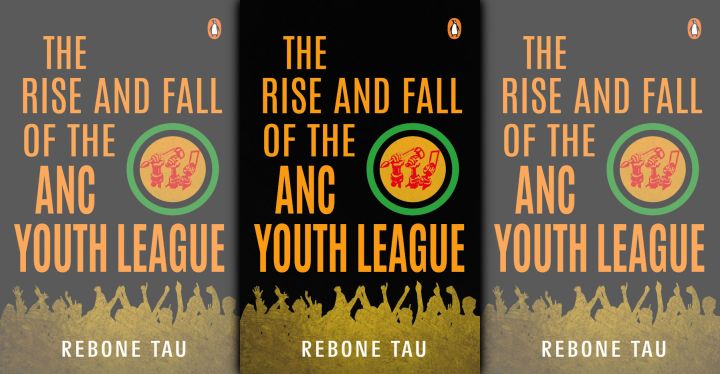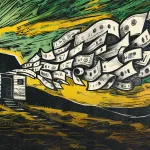BOOK EXCERPT
‘The Rise and Fall of the ANC Youth League’ by Rebone Tau

In her new book, Rebone Tau details how one of South Africa’s most powerful political bodies fell into ruin. In this exclusive excerpt, we see just how low the ANCYL found it could go, before falling utterly to pieces. Our scene opens with the absence of Youth League leadership in the #FeesMustFall movement, and reveals how that period was a turning point in the movement’s history.
An organisation that … does not take time to include the small voices is a breeding ground for dissent. No matter how strong the organisation, once dissent emerges, its unity and sanctity is watered down. Moderation in all things is a useful tool, [and] constant engagement and listening creates a platform for trust – that is [the basis] for a solid, grounded organisation. Call it a function of growing up, but listening is a far better tool of engagement.
– Vuyiswa Tulelo, former ANCYL deputy secretary-general and NEC member
In The Rise and Fall of the ANC Youth League, Rebone “Sankara” Tau tells the history of the ANC Youth League, from its formation in 1944 to the present day. The book provides a fascinating glimpse into a vital and volatile institution in South African politics. Tau explores the radicalising role played by the ANCYL’s early leaders, such as Nelson Mandela, Walter Sisulu and OR Tambo; the formation of the ANC Youth and Students Section in exile, first led by Thabo Mbeki; the return from exile in the 1990s and the leadership of Peter Mokaba; and the controversies around the appointment of Julius Malema and his subsequent sacking. Finally, Tau considers the role that the Youth League should play in the future.
Read this excerpt from chapter 6 of her book, The fall of the ANCYL.
***
The #FeesMustFall campaign ultimately achieved its immediate objective of stopping the scheduled annual fee increment when the government undertook to subsidise it. But there was still a need to continue engaging on the issue of education, including basic education. As the youth league of South Africa’s ruling party, the ANCYL was in a key position to effect change. Two issues – high dropout rates and high graduate unemployment – were already being taken up by SASCO, while COSAS was championing the right to free basic education. As a member of the Progressive Youth Alliance, the ANCYL could have focused on garnering support or providing leadership for these causes. It did not do this, nor did it make its voice heard on campuses, except to lobby for votes in the run-up to the ANC national conference in December 2017. This allowed the EFF to increase its support among the youth by speaking to their needs, despite not having a youth league of its own.
This was not the end of the ANCYL’s woes. At the beginning of 2016, an alleged “hit list” surfaced. All the names on the list were supporters of KwaZulu-Natal premier Senzo Mchunu, who had lost the post of ANC provincial chairperson to rival Sihle Zikalala in November the previous year. The first name on the list was that of Joe Dlamini, who had been shot dead two weeks before the list emerged.
A series of ANC task teams were set up to address the issue. They were largely unsuccessful. The Moerane Commission, which looked into political killings at Glebelands hostel in KwaZulu-Natal, released a report detailing a catalogue of government failures and material greed in the province, but did not go far enough in its findings and recommendations. In addition, the commission exposed whistle-blowers who had spoken openly about corruption in the ANC to a serious threat of violence.
Most political killings have been perpetrated against those exposing corruption in provincial government. This highlights the intense competition for positions that come with perks such as access to tender opportunities, and the rivalry for youth leadership positions that would ensure a place in the patronage network.
But political killings were only a symptom of more deep-rooted problems in the ANCYL. Factionalism and gatekeeping were by now so entrenched in the league that they had become the norm. The bulk-buying of memberships in order to gain political advantage meant that local structures swelled but the quality of comrades declined. ANCYL leaders used the league as a way to accumulate wealth and status, and paraded this to members. Young people were increasingly used as pawns in factional battles within the league and the ANC. Women were treated as if membership were a favour they were being granted, and they were denied leadership positions, despite the ANCYL constitution stipulating that 50 per cent of leadership positions should be held by women. Meanwhile, COSAS elected two successive female presidents – Sandra Baloyi in 2014 and Zama Khanyase in 2016 – displaying a willingness to evolve that the ANCYL did not.
In June 2016, former ANCYL deputy president Ronald Lamola and others led a march to Luthuli House, the headquarters of the ANC. The campaign was called #OccupyLuthuliHouse and, among other things, it protested against Jacob Zuma’s presidency, which the marchers felt had led to a decline in support for the Youth League. They demanded that the ANC NEC resign, Zuma included. Meanwhile, the rest of the ANCYL leadership came out in defence of Luthuli House and many comrades were bussed in to confront their fellow comrades. This pointed to a complete breakdown in communication within the league. Some members felt that their voices were not being heard, and internal challenges were left unresolved. The legacy of robust discussion within the movement had come to an end.
The ANCYL could once stand tall among other political formations, hold its own in the battle of ideas, and win. It is now mainly associated with corruption scandals and disorganisation.
It can be argued that the degeneration of the ANCYL did not start in recent years, but was part of an ongoing decline that began at the 2008 ANCYL national congress in Mangaung, where factionalism and disruptive behaviour led to an early adjournment. The congress reconvened some months later, after deliberations by the ANC NEC, but the warning signs of the ANCYL’s degeneration were ignored.
By September 2018, the 25th ANCYL NEC’s three-year term had come to an end, and it was due for congress. However, the NEC once again failed to prepare for a congress in time and a task team comprising ANC NEC members was appointed to help the ANCYL go to congress. A new date was set for December 2018, but no communiqué was sent from the office of the ANCYL secretary-general informing members of further developments. History seemed doomed to repeat itself. More than two years later, nothing has been communicated to members about why the congress was not held.
The ANC did not do well in the 2019 national elections, receiving its lowest vote since 1994. In this regard, the ANCYL was seen to have failed the ANC, neglecting its responsibility to rally the youth’s support. A few months later, on 4 July 2019, ANCYL members learnt of the league’s liquidation in a letter from ANC secretary-general Ace Magashule to legal practitioners Mponyana Ledwaba Inc., which was circulated on Facebook. The letter acknowledged a memorandum delivered by ANCYL members who had led a march to Luthuli House on 31 May 2019, calling for the disbandment of the ANCYL NEC. The letter indicated that the ANCYL could not perform its legal duties and was applying for rehabilitation. It seemed that the ANCYL NEC lacked the political will to save its organisation from liquidation. At this point, one could say that the ANCYL had fallen.
However, not everyone gave up on the league. ANCYL members Thabo Mabotja and Ngoako Selamolela called on young people to advocate for the revival, renewal, rebuilding and restoration of the ANCYL to its former glory. Members convened a council to lead the revolutionary disbandment movement, the aim of which was for the ANC NEC to disband the ANCYL NEC and revive the Youth League. It was clear that the NEC’s leadership mandate had expired, it could not convene a congress, and it was unable to execute its primary mandate, which was to mobilise and rally young people behind the banner of the ANC. Only twelve people showed up for the first march, but there were 750 people at the second, and by the time a march was organised to Sisulu House there were 2 000 participants. That number doubled for the march to Luthuli House in June 2019 to hand over a memorandum to the ANC secretary-general.
A month later, the ANC NEC finally disbanded the ANCYL NEC and appointed an ANC National Youth Task Team to take the ANCYL to its national congress and rebuild the league. However, many felt that the ANC’s notion of “rebuilding” the Youth League was more about recruiting members and producing activists than getting back to what made the ANCYL a strong organisation, namely political education.
This latest task team was led by convener Tandi Mahambehlala, and head of ANC presidency Sibongile Besani was appointed coordinator. The mandate of the task team was to rebuild the ANCYL and take it to a national congress by March 2020. Would it be possible to rebuild a dysfunctional organisation in less than a year? It would appear not. In October 2019 Fikile Mbalula and Malusi Gigaba, both of whom were part of the task team, had to flee the ANCYL cadre forum in Limpopo when attendees started throwing chairs at each other and two vehicles were set alight. This was just a preview of the challenges facing the ANCYL, particularly the widespread lack of political tolerance that came in the wake of institutionalised factionalism. A month later, another ANCYL cadre forum in Tshwane descended into chaos and one member, Lethabo Nkoana, was shot dead.
The ANCYL could once stand tall among other political formations, hold its own in the battle of ideas, and win. It is now mainly associated with corruption scandals and disorganisation. Its potent identity and status as an organisation that counted giants like Nelson Mandela, Walter Sisulu and Oliver Tambo among its luminaries, is now a memory. The ANCYL has abandoned its political mandate. It must work to win it back. DM/ML
Rebone Tau is a former member of the ANC Youth League National Task Team and the chairperson of the sub-committee on international relations. She is an associate of the Southern African Liaison Office (SALO), a South African-based civil society organisation that contributes to building peace and security through facilitating dialogue and consensus between national, regional and international actors. She has written opinion pieces on politics for various publications, including Daily Maverick, and was shortlisted for the City Press Tafelberg Non-Fiction Award for the manuscript of this book in 2016.
The Rise and Fall of the ANC Youth League is published by Penguin Random House South Africa (R190). Visit The Reading List for South African book news – including excerpts! – daily.
Look out for the Daily Maverick webinar featuring Rebone Tau on 10 September, the anniversary of the founding of the ANC Youth League, at 12:00.

















